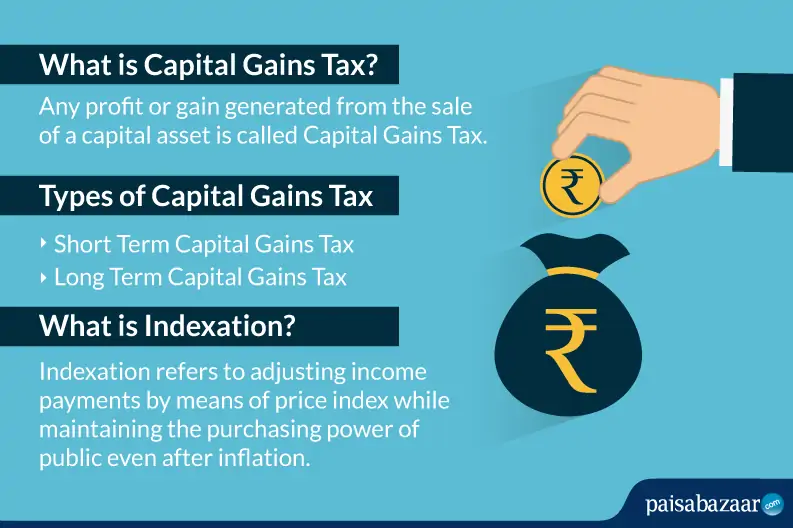Ahmedabad
(Head Office)Address : 506, 3rd EYE THREE (III), Opp. Induben Khakhrawala, Girish Cold Drink Cross Road, CG Road, Navrangpura, Ahmedabad, 380009.
Mobile : 8469231587 / 9586028957
Telephone : 079-40098991
E-mail: dics.upsc@gmail.com

Capital Gains Tax
News: The capital gains tax structure in India is complicated, and it is time for a relook since the union budget has provisions for 30% tax on cryptocurrency.
Details:
• Capital gains tax is levied on the profits made on investments.It covers real estate, gold, stocks, mutual funds, and various other financial and non-financial assets.
• It is divided into long-term capital gains tax (LTCG) and short-term capital gains tax (STCG) depending on how long you have held the investment in question.
• Unlike income tax, the percentage of tax does not change on the basis of your overall tax slab.
• The LTCG tax, excluding surcharge, on equity is the same for gains of ₹10 lakh or ₹10 crore.
• There is also a separate set of deductions that apply to LTCG, which do not apply to ordinary income.
• Capital gains tax is complicated for a few primary reasons.
1. First, the rate changes from asset to asset. LTCG tax on stocks and equity mutual funds is 10% but on debt mutual funds is 20% with indexation.
2. Second, holding period changes from asset to asset. The holding period for LTCG tax is two years in real estate, one year for stocks, and three years for debt mutual funds and gold.
3. Third, exemptions available against it come with their own complex conditions. For instance, buying a house after selling one can get you an exemption, but the new house must be bought in two years or built in three years of the sale.
• The 2022 budget has proposed a 30% tax on cryptocurrency, which is higher than capital gains tax in many cases.Besides, under capital gains tax, investors can adjust profits and losses on different investments against each other or against profits/losses in the future.
• However, this cannot be done with cryptocurrency.As capital gains tax is the same regardless of your overall income it can compound inequality.For instance, a person with a salary of ₹40 lakh will pay 30% tax on it but just 10% LTCG tax on gains from stock trading.
• A person with a salary of ₹5 lakh will pay a 5% tax on it but the same 10% LTCG tax on stock trading.
• Second, the smaller one-year qualifying period for LTCG in stocks compared to three years in debt mutual funds may encourage short-term trading in equity.
Way forward:
• The government can bring about uniformity in rates and holding periods for various assets to ensure that the tax for one asset is not more attractive than another.
• A uniform and long holding period to qualify for LTCG can also discourage short-term trading and speculative behavior in assets such as stocks.
• The exemptions for LTCG such as reinvestment in another house property or capital gains bonds can also be made simpler, with fewer conditions.
• Small investors can also be given relief by reducing rates of capital gains.

Address : 506, 3rd EYE THREE (III), Opp. Induben Khakhrawala, Girish Cold Drink Cross Road, CG Road, Navrangpura, Ahmedabad, 380009.
Mobile : 8469231587 / 9586028957
Telephone : 079-40098991
E-mail: dics.upsc@gmail.com
Address: A-306, The Landmark, Urjanagar-1, Opp. Spicy Street, Kudasan – Por Road, Kudasan, Gandhinagar – 382421
Mobile : 9723832444 / 9723932444
E-mail: dics.gnagar@gmail.com
Address: 2nd Floor, 9 Shivali Society, L&T Circle, opp. Ratri Bazar, Karelibaugh, Vadodara, 390018
Mobile : 9725692037 / 9725692054
E-mail: dics.vadodara@gmail.com
Address: 403, Raj Victoria, Opp. Pal Walkway, Near Galaxy Circle, Pal, Surat-394510
Mobile : 8401031583 / 8401031587
E-mail: dics.surat@gmail.com
Address: 303,305 K 158 Complex Above Magson, Sindhubhavan Road Ahmedabad-380059
Mobile : 9974751177 / 8469231587
E-mail: dicssbr@gmail.com
Address: 57/17, 2nd Floor, Old Rajinder Nagar Market, Bada Bazaar Marg, Delhi-60
Mobile : 9104830862 / 9104830865
E-mail: dics.newdelhi@gmail.com